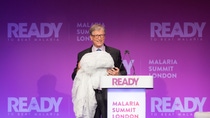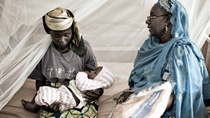Sustainability
Our goal: A world free of malaria by 2040
Malaria occurs in many countries, especially in tropical and subtropical regions. Sub-Saharan Africa continues to carry a disproportionately high share of the global malaria burden, followed by South-East Asia and the Eastern Mediterranean. Six African countries and India account for almost 85% of the global malaria burden. The disease takes a huge toll on human health. The World Health Organization (WHO) estimates that in 2018 there were 228 million cases of malaria resulting in an estimated 405,000 deaths. Two thirds of all malaria deaths occur in children under the age of five.

There is no vaccine for malaria, but it can be prevented and treated. Methods used to prevent malaria include medication, mosquito controls and the prevention of bites. The WHO recommends protection for all people at risk of malaria with effective malaria vector control. Since 2000, more than 663 million clinical cases of malaria have been averted – 78% of which were due to mosquito control interventions such as long-lasting insecticide treated bednets (LNs) and indoor residual spraying (IRS). Fighting malaria is a top priority of the Bill & Melinda Gates Foundation.

Innovation needed to maintain progress
Leading agricultural companies BASF, Bayer, Mitsui Chemical, Sumitomo Chemical and Syngenta have been a major driving force behind the efforts to fight malaria; helping to develop and deliver innovative insecticides for use on bed nets and for indoor spraying, so saving millions of lives.
A decade ago, these companies provided the Innovative Vector Control Consortium (IVCC) access to their chemical libraries to support the search for novel insecticide modes of action that could be developed for public health use. This public private collaboration continues to this day, and has produced a pipeline of novel vector control solutions to support the global efforts to eradicate mosquito-borne diseases. The progress made in reducing cases of malaria to date is one of the world’s greatest health achievements. We cannot take this progress for granted however - the WHO has reported a troubling shift in the trajectory of this global malaria disease burden, and cases are increasing again. Further innovation is required to combat insecticide resistance and prevent established tools from becoming less effective. Without the continued support and innovation of the agricultural industry, the hard-won gains of the past two decades could be quickly reversed, costing many millions of lives.
United against malaria
On April 18, 2018, BASF, Bayer, Mitsui Chemical, Sumitomo Chemical and Syngenta announced their continued and strengthened commitment to research, develop and deliver innovative mosquito control tools to help end malaria for good by 2040.
Working together with IVCC and global partners, including the Bill & Melinda Gates Foundation (BMGF), the UK Government's Department for International Development (Dfid), USAID, the Swiss Agency for Development and Cooperation (SDC) and Unitaid, the companies committed to the following principles, and invited other companies working in the field of mosquito control to join them in the fight to eradicate malaria.
BASF: Combining science and action
With a rapidly growing population, the world is increasingly dependent on our ability to develop and maintain sustainable agriculture and healthy environments. Our Public Health business helps to improve the quality of life for millions of children and adults around the globe by preventing malaria and other neglected tropical diseases.
Our Public Health team is active in the international malaria community, representing BASF on numerous taskforces on neglected tropical diseases, integrated vector management and long-lasting insecticidal nets.
Combining ground-breaking science with practical down-to-earth action, we develop products that combat disease-transmitting insects and bring them, in collaboration with international health, government and humanitarian organizations, to the communities that need them.
WHO-recommended public health portfolio
BASF’s public health portfolio includes Fendona® indoor residual sprays, Abate® larvicides and Interceptor® long-lasting, insecticide treated mosquito nets. Interceptor® G2, a new generation mosquito net to combat resistant mosquitoes, was launched recently and is currently being rolled out as part of The New Nets Project set up by the Global Fund and Unitaid, along with the President’s Malaria Initiative and the Bill & Melinda Gates Foundation. A new second-generation indoor residual spray, Sylando®, is being currently being evaluated by independent scientific authorities.
Read more about BASF’s public health portfolio: www.publichealth.basf.com
